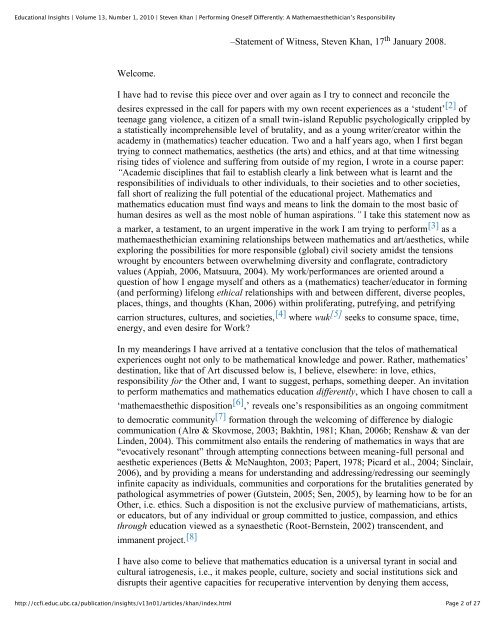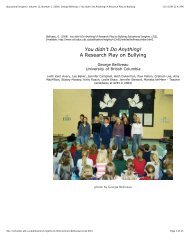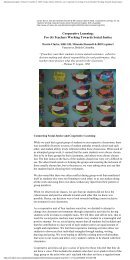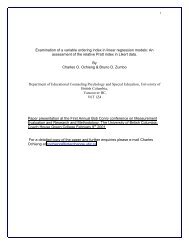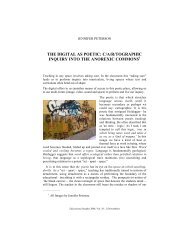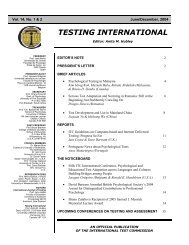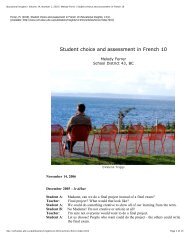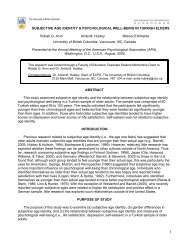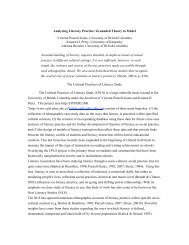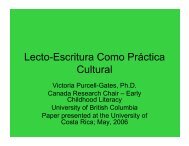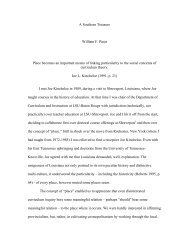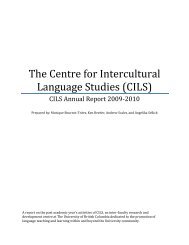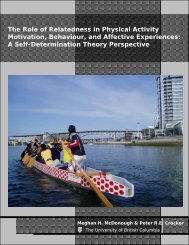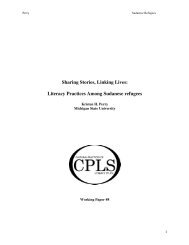Printer Version - University of British Columbia
Printer Version - University of British Columbia
Printer Version - University of British Columbia
You also want an ePaper? Increase the reach of your titles
YUMPU automatically turns print PDFs into web optimized ePapers that Google loves.
Educational Insights | Volume 13, Number 1, 2010 | Steven Khan | Performing Oneself Differently: A Mathemaesthethician’s Responsibility<br />
Welcome.<br />
http://ccfi.educ.ubc.ca/publication/insights/v13n01/articles/khan/index.html<br />
–Statement <strong>of</strong> Witness, Steven Khan, 17 th January 2008.<br />
I have had to revise this piece over and over again as I try to connect and reconcile the<br />
desires expressed in the call for papers with my own recent experiences as a ‘student’ [2] <strong>of</strong><br />
teenage gang violence, a citizen <strong>of</strong> a small twin-island Republic psychologically crippled by<br />
a statistically incomprehensible level <strong>of</strong> brutality, and as a young writer/creator within the<br />
academy in (mathematics) teacher education. Two and a half years ago, when I first began<br />
trying to connect mathematics, aesthetics (the arts) and ethics, and at that time witnessing<br />
rising tides <strong>of</strong> violence and suffering from outside <strong>of</strong> my region, I wrote in a course paper:<br />
“Academic disciplines that fail to establish clearly a link between what is learnt and the<br />
responsibilities <strong>of</strong> individuals to other individuals, to their societies and to other societies,<br />
fall short <strong>of</strong> realizing the full potential <strong>of</strong> the educational project. Mathematics and<br />
mathematics education must find ways and means to link the domain to the most basic <strong>of</strong><br />
human desires as well as the most noble <strong>of</strong> human aspirations.” I take this statement now as<br />
a marker, a testament, to an urgent imperative in the work I am trying to perform [3] as a<br />
mathemaesthethician examining relationships between mathematics and art/aesthetics, while<br />
exploring the possibilities for more responsible (global) civil society amidst the tensions<br />
wrought by encounters between overwhelming diversity and conflagrate, contradictory<br />
values (Appiah, 2006, Matsuura, 2004). My work/performances are oriented around a<br />
question <strong>of</strong> how I engage myself and others as a (mathematics) teacher/educator in forming<br />
(and performing) lifelong ethical relationships with and between different, diverse peoples,<br />
places, things, and thoughts (Khan, 2006) within proliferating, putrefying, and petrifying<br />
carrion structures, cultures, and societies, [4] where wuk [5] seeks to consume space, time,<br />
energy, and even desire for Work?<br />
In my meanderings I have arrived at a tentative conclusion that the telos <strong>of</strong> mathematical<br />
experiences ought not only to be mathematical knowledge and power. Rather, mathematics’<br />
destination, like that <strong>of</strong> Art discussed below is, I believe, elsewhere: in love, ethics,<br />
responsibility for the Other and, I want to suggest, perhaps, something deeper. An invitation<br />
to perform mathematics and mathematics education differently, which I have chosen to call a<br />
‘mathemaesthethic disposition [6] ,’ reveals one’s responsibilities as an ongoing commitment<br />
to democratic community [7] formation through the welcoming <strong>of</strong> difference by dialogic<br />
communication (Alrø & Skovmose, 2003; Bakhtin, 1981; Khan, 2006b; Renshaw & van der<br />
Linden, 2004). This commitment also entails the rendering <strong>of</strong> mathematics in ways that are<br />
“evocatively resonant” through attempting connections between meaning-full personal and<br />
aesthetic experiences (Betts & McNaughton, 2003; Papert, 1978; Picard et al., 2004; Sinclair,<br />
2006), and by providing a means for understanding and addressing/redressing our seemingly<br />
infinite capacity as individuals, communities and corporations for the brutalities generated by<br />
pathological asymmetries <strong>of</strong> power (Gutstein, 2005; Sen, 2005), by learning how to be for an<br />
Other, i.e. ethics. Such a disposition is not the exclusive purview <strong>of</strong> mathematicians, artists,<br />
or educators, but <strong>of</strong> any individual or group committed to justice, compassion, and ethics<br />
through education viewed as a synaesthetic (Root-Bernstein, 2002) transcendent, and<br />
immanent project. [8]<br />
I have also come to believe that mathematics education is a universal tyrant in social and<br />
cultural iatrogenesis, i.e., it makes people, culture, society and social institutions sick and<br />
disrupts their agentive capacities for recuperative intervention by denying them access,<br />
Page 2 <strong>of</strong> 27


